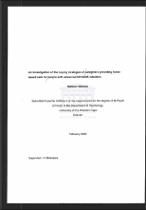| dc.contributor.advisor | Shabalala, N | |
| dc.contributor.author | Melnick, Melissa | |
| dc.date.accessioned | 2022-08-31T09:57:35Z | |
| dc.date.available | 2022-08-31T09:57:35Z | |
| dc.date.issued | 2002 | |
| dc.identifier.uri | http://hdl.handle.net/11394/9276 | |
| dc.description | Magister Psychologiae - MPsych | en_US |
| dc.description.abstract | The main aim of this exploratory pilot survey is firstly, to provide descriptive statistics for the Ways of Coping Questionnaire for a group of home-based caregivers within the South African HIV/AIDS home-based care context. Secondly, to examine the relationship between demographic variables (age, gender, financial status, education) and the scores on the Ways of Coping Questionnaire for the home-based caregivers. Thirdly to provide a context for the quantitative results obtained by qualitatively identifying current sources of occupational stress for the participating home-based caregivers and factors that they perceive as being able to assist them to cope better with these stressors. The questionnaire was administered to a sample of 82 caregivers from four home-based care organizations. The data was analysed using descriptive statistics to determine the coping strategies used and the reliability of the Ways of coping Questionnaire. Results indicated that seven of the eight ways of coping questionnaire subscales were not functioning reliably in this study. It was further concluded that it would not be useful to do additional comparisons of the relationship of the eight subscales with the demographic variables, as any relationships found would be weakened by the unreliability of the scales. A non-random sample of qualitative responses to two open-ended questions was analysed impressionistically. The analysis suggested that poverty, Iack of medical resources, coping with helplessness and death were frequent stressors. Caregivers used their faith, support from family and colleagues as well as controlling of their emotions as ways of coping. They felt that additional training and support groups, government support, places of safety for PWAs and
equipment/food would assist them to cope better with the demands of their work. lt was recommended that future research adopt a more appropriate methodology given the cross-cultural and cross-linguistic difficulties evident in the study. The construction of a new coping scale suitable to the South African context is also suggested. Further research is recommended to investigate the qualitative coping experience of homebased caregivers working with HIV/AIDS, the impact of interventions to improve coping, and to explore the relationship between burnout and coping. | en_US |
| dc.language.iso | en | en_US |
| dc.publisher | University of the Western Cape | en_US |
| dc.subject | South Africa | en_US |
| dc.subject | Human immunodeficiency virus (HlV) and Acquired immune deficiency syndrome (HIV/AIDS) | en_US |
| dc.subject | Medical Research Council of South Africa (MRCSA) | en_US |
| dc.subject | Escape-Avoidance | en_US |
| dc.subject | Positive Reappraisal | en_US |
| dc.subject | Social Support | en_US |
| dc.subject | Ways of Coping Questionnaire (WCQ) | en_US |
| dc.subject | Home-based care organisations | en_US |
| dc.title | An investigation of the coping strategies of caregivers providing home' based care for people with advanced HIV/AIDS infection. | en_US |
| dc.rights.holder | University of the Western Cape | en_US |

